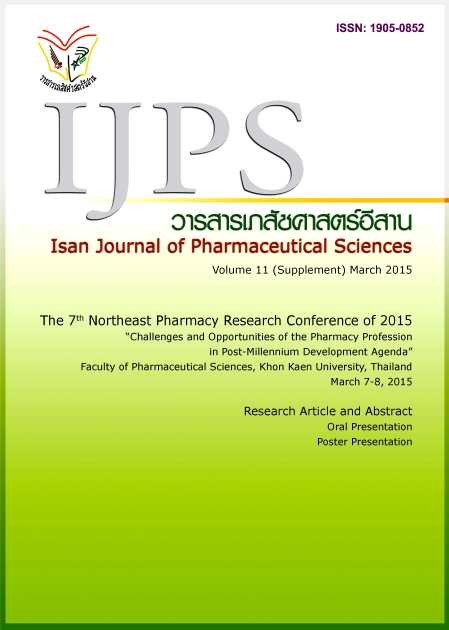Development of medication service system to reduce medication error for patients with chronic diseases at Phakhai Primary Care Unit, Ayutthaya
Main Article Content
Abstract
Introduction: Nowadays, patients with chronic disease in primary care unit have been extensively increasing each year. However, this goes against proportion of staff on duty resulting in having overload leading to medication errors. In addition, the existing service system is not able to serve large number of patients Objectives: This study aimed to develop medication service system for patients with chronic diseases at Primary Care Unit. Method: The study is action research conducted with 8 staff providing services at chronic disease clinic. The researcher collected data via observations interviews and workshops. The researcher analyzed situations by using interviews and analyzed chances of errors and effects to map out development plan for the service system based on medication errors. The results of analysis were investigated, planed, practiced and reflected process of practice. The changes of medication errors were measured before and after each research cycle. Results: The 3 action research cycles took place. The first cycle focused on developing medicine database by using Hosxp pcu to reduce prescribing errors and medicine labeling errors. This can be done by improving accurate medicine database for chronic disease in the program to reduce the next prescribing errors. The second cycle emphasized on improving the service system that causes risks for medicine errors by matching medicine photos with their homophones, using Tallman Letters, sorting and arranging medicine. The third cycle was to learn from the staff that provided services for patients with chronic disease apart from the clinic days. This focused on learning how to check error prior to prescribing which is simple to do and on reporting medicine errors. These enabled consistent development of the service system through knowledge management of each cycle that creates cooperative learning. Conclusion: After the development of medication service system for patients with chronic diseases at Primary Care Unit result of medication errors decreased. Since the process of prescribing, information on drug labeling and pre-dispensing cause the system more efficient and effective services in primary care. However, the process of monitoring the performance of the service is important. To achieve continuous improvement and sustainability
Article Details
In the case that some parts are used by others The author must Confirm that obtaining permission to use some of the original authors. And must attach evidence That the permission has been included
References
Garfield S, Barber N, Walley P, Willson A, Eliasson L. Quality of medication use in primary care--mapping the problem, working to a solution: a systematic review of the literature. BMC Medicine [serial online] 2009 ;7:50: [8 screens]. Available from: http://www.biomedcentral.com/1741-7051/7/50. Accssed August 8, 2014.


